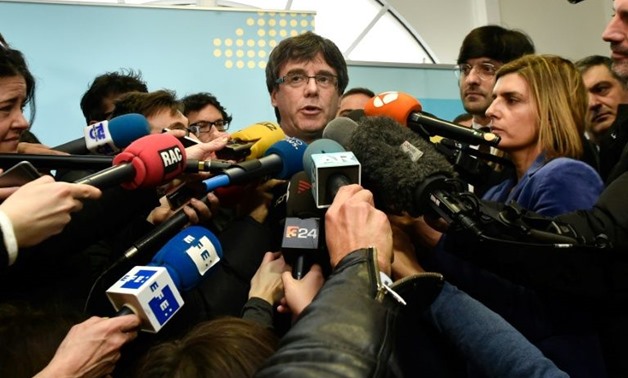
Centre of attention: atalonia's sacked leader Carles Puigdemont addresses reporters after meeting with the speaker of the Catalan regional Parliament in Brussels on Wednesday - AFP
SPAIN - 27 January 2018: The Spanish government on Friday turned to the courts to try to stop Catalonia's ousted separatist leader Carles Puigdemont from returning to power despite facing arrest.
Puigdemont, who fled to Belgium after the Catalan parliament declared independence in October, was earlier this week chosen as its candidate to lead Catalonia again after December elections saw separatist parties win an absolute majority of seats.
Catalonia's regional parliament is scheduled to debate and vote on Tuesday whether to reinstall Puigdemont, who faces arrest for rebellion, sedition and misuse of public funds over his attempt to break Catalonia from Spain as soon as he comes back.
But Spain's conservative central government on Friday filed a legal challenge with the country's Constitutional Court against Puigdemont's bid to return to power, on the grounds that as a fugitive of justice, he cannot be elected.
"A person who is wanted in national territory for such serious crimes cannot try to be sworn in as head of the Catalan government without having faced up to his responsibilities with the law," Spain's Deputy Prime Minister Soraya Saenz de Santamaria said after announcing the appeal.
"The government must use every tool made available by the laws and the constitution to make sure that a fugitive, someone who is on the run from the law and the courts, cannot be illegitimately be sworn in."
The court will meet on Saturday to study the government's challenge. If it agrees to take up the case, the parliamentary session to swear in Puigdemont would be automatically suspended while the court considers legal arguments.
- Sworn in remotely? -
"If the speaker of the parliament obeys, he cannot call the investiture session," said University of Barcelona constitutional law professor Xavier Arbos.
The newly elected speaker of the Catalan parliament, Roger Torrent, said Puigdemont remains the sole candidate to head the new Catalan government although a final decision will be taken once the court makes it ruling.
"Everything is in the hands of Mr. Torrent. To obey or not," added Arbos.
Catalonia's ousted separatist government pushed ahead with an independence referendum on October 1 despite it having been banned by the Constitutional Court.
How Puigdemont can return to power remains a mystery as he needs to be physically present in the regional parliament to be sworn in, and Spanish authorities have vowed he will be arrested as soon as he returns to Spain.
He has said he could be sworn in remotely from Brussels, a plan Spain's central government opposes.
Puigdemont has also said he would rather return to Spain, but without any risk of arrest.
The government turned to the court even though the Council of State -- its top consultative body which advises on serious issues -- advised against the move late on Thursday, saying a "preventative challenge" was banned by the constitution.
But Saenz de Santamaria said that while the government respects the body's "legal criteria", its opinion "is not binding for the government".
- 'Absolutely chaotic' -
Yolanda Gomez, a constitutional law expert at Spain's distance-learning university UNED, said the government was using all legal tools it has "because the situation in Catalonia has boiled over" and the separatist camp always stayed one step ahead of it.
"The legal situation is absolutely chaotic, no one legislates thinking that a top official would do what" Puigdemont is doing, she added.
Catalonia's independence declaration on October 27 was short-lived as Prime Minister Mariano Rajoy moved to stop the crisis in a region deeply divided over secession.
He imposed direct rule on the semi-autonomous region, sacked its government including Puigdemont, dissolved its parliament and called snap elections.
Several days later, separatist leaders were charged for their attempt to break from Spain via a banned independence referendum, but by then Puigdemont and several of his former ministers were already in Belgium.
Deposed vice president Oriol Junqueras, however, remained in Spain and was jailed along with others pending a probe into their role in the independence drive.
But in a major setback for the central government, separatist parties won 70 of the 135 seats in Catalonia's regional parliament -- two less than in the 2015 election -- during last month's snap election.


Comments
Leave a Comment